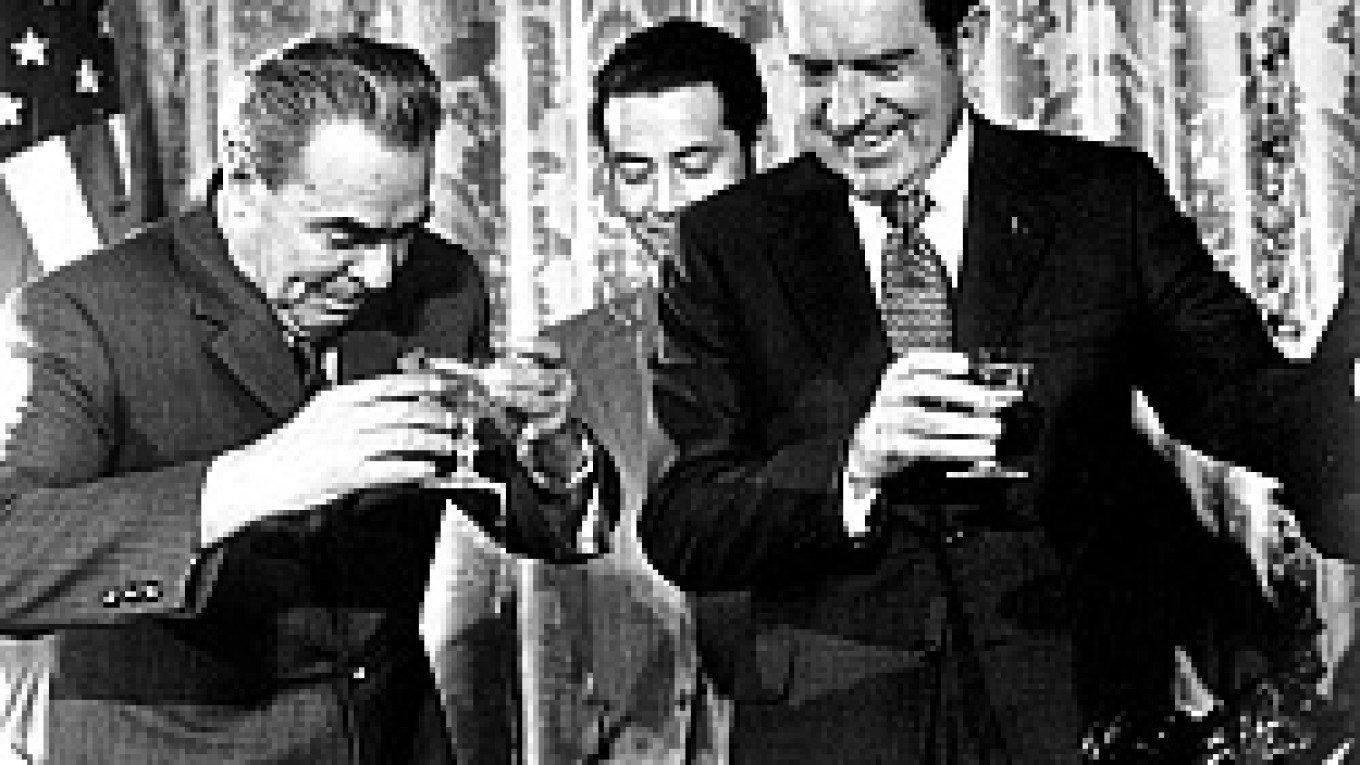Brezhnev told Nixon he knew he would not "crack under the pressure."
The message, delivered to Nixon by Soviet Ambassador Anatoly Dobrynin, proposed "self-control and fortitude" in conducting foreign policy, Dobrynin wrote in a foreword to the documents.
At first, Moscow paid little attention to Watergate, but as the scandal of the break-in at Democratic offices focused on Nixon, Dobrynin wrote, concern grew in the Politburo that it could damage improvements in U.S.-Soviet relations.
"One began to sense his growing bewilderment, lack of confidence and withdrawal from other matters," Dobrynin wrote.
The ambassador was instructed to meet immediately and secretly with Nixon to deliver the message of support from Brezhnev.
"No doubt, there are some people -- and not only in the United States -- who anticipate that Richard Nixon won't be able to take it and will crack under the pressure," Dobrynin said he told the president on Brezhnev's behalf. "But, we are pleased to note, you have no intention of giving them that satisfaction."
In response, and speaking slowly, Nixon said he wished to thank Brezhnev "for the fact that he, perhaps alone among the leaders of other nations, including the allies, had found simple human words to lift his spirits," Dobrynin wrote in the documents released this week.
Nixon went on to hold a summit in the summer of 1974 with Brezhnev in Moscow, but his days in the White House were numbered: He resigned in August.
While Nixon was a firm adherent of U.S. strength, he favored a nonconfrontational approach to dealing with the Soviet Union, Dobrynin reported to Moscow in 1969, at the start of a unique personal relationship with Washington.
The State Department documents portrayed Nixon as not counting on the use of force. Quoting from an urgent telegram Dobrynin sent to Moscow, sizing up the new president, differences were too deep to bridge completely.
But Dobrynin told the Soviet Foreign Ministry in his cable that "the new president is opposed to methods of brinkmanship in relations with the U.S.S.R., since he believes that both our countries have at their disposal sufficient nuclear missiles to annihilate each other many times over."
By all indications, Dobrynin told Moscow, Nixon "will pursue a pragmatic course that envisages negotiations with the Soviet Union in cases where it serves U.S. interests and where it is possible to reach a compromise."
Historian David Geyer, the principal U.S. compiler for the project, said Wednesday that it reflected "an unprecedented partnership between the two governments to document an exchange of views at a high level, particularly at an important period of the Cold War."
"The documents also give readers and scholars a different view on foreign policy from the perspective of the other superpower," Geyer said.
A Message from The Moscow Times:
Dear readers,
We are facing unprecedented challenges. Russia's Prosecutor General's Office has designated The Moscow Times as an "undesirable" organization, criminalizing our work and putting our staff at risk of prosecution. This follows our earlier unjust labeling as a "foreign agent."
These actions are direct attempts to silence independent journalism in Russia. The authorities claim our work "discredits the decisions of the Russian leadership." We see things differently: we strive to provide accurate, unbiased reporting on Russia.
We, the journalists of The Moscow Times, refuse to be silenced. But to continue our work, we need your help.
Your support, no matter how small, makes a world of difference. If you can, please support us monthly starting from just $2. It's quick to set up, and every contribution makes a significant impact.
By supporting The Moscow Times, you're defending open, independent journalism in the face of repression. Thank you for standing with us.
Remind me later.


